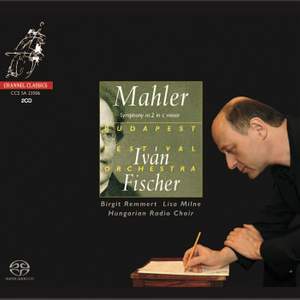Mahler: Symphony No. 2 'Resurrection'
Lisa Milne (soprano) & Birgit Remmert (alto)
Budapest Festival Orchestra & The Hungarian Radio Choir, Iván Fischer
…Fischer… rarely pushes too hard. The orchestral sound is lean but not undernourished, allowing for even balance between contesting lines - outstanding in the funereal coda of the first movement... — More…
-
Gramophone MagazineAwards Issue 2006Disc of the Month
Downloads
What are FLAC and MP3?Contents
Mahler: Symphony No. 2 'Resurrection'
Work length1:22:18
Album only
Album only
Album only
Album only
- Birgit Remmert, Hungarian Radio Choir, Lisa Milne
- Budapest Festival Orchestra
- Iván Fischer
I. Allegro maestoso
Track length21:46
Album only
Album only
Album only
Album only
II. Andante moderato
Track length10:02
$1.50
$2.10
$2.60
$3.05
III. In ruhig fliessender Bewegung
Track length11:18
$2.05
$2.80
$3.50
$4.05
IV. Urlicht, "Der Mensch liegt in grösster Not". Sehr feierlich, aber schlicht (Contralto)
Track length4:52
$1.00
$1.40
$1.75
$2.05
V. Im Tempo des Scherzos - Langsam. Misterioso, "Aufersteh'n" (Chorus, Soprano) - Etwas bewegter, " O glaube, mein Herz … Aufersteh'n" (Alto, Soprano, Chorus)
Track length34:20
Album only
Album only
Album only
Album only







